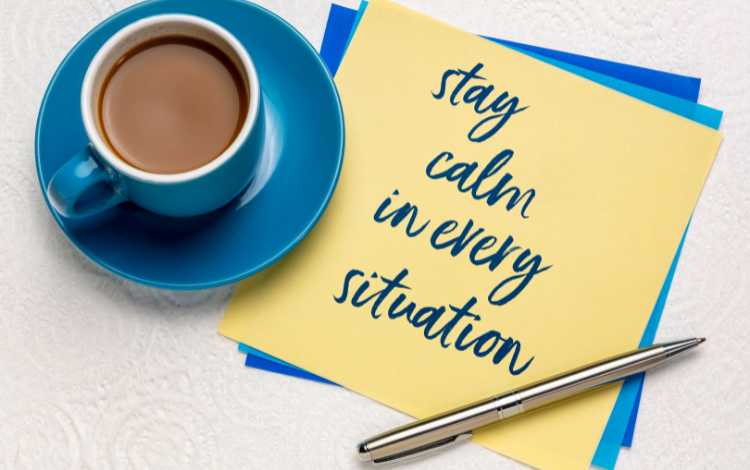
In today’s fast-paced world, we are constantly bombarded with stressors from work, relationships, finances, and more. It’s no wonder that so many of us struggle with anxiety, depression, and other mental health issues.
However, it’s important to remember that we have the power to calm our minds and reduce stress.
In this blog post, we’ll explore the importance of calming your mind, the effects of stress on your body, and some strategies for achieving inner peace.
Why You Need to Calm Your Mind
Browse our online courses on meditation, positive thinking, overcoming procrastination, confidence, and freedom from distractions.
Calming your mind is essential for your mental and physical well-being. When your mind is calm, you are better able to focus on the present moment, reduce negative thoughts and emotions, and improve your overall quality of life.
Calming your mind also helps reduce stress, which can have harmful effects on your body. High levels of stress can lead to a weakened immune system, increased risk of heart disease, and other serious health problems.
Here are five reasons why you need to calm your mind:
1. Reduce Stress
One of the primary benefits of calming your mind is reducing stress. When you are stressed, your body releases stress hormones like cortisol and adrenaline, which can have harmful effects on your health.
By calming your mind, you can lower your stress levels and reduce the negative effects of stress on your body.
2. Improve Mental Health
Calming your mind can also have positive effects on your mental health. It can help reduce symptoms of anxiety and depression, improve your mood, and promote feelings of inner peace and contentment.
3. Improve Focus and Productivity
When your mind is calm, you are better able to focus on the present moment and concentrate on the task at hand. This can help improve your productivity and performance at work, at school and everywhere else.
4. Improve Physical Health
Chronic stress can have harmful effects on your physical health, such as increasing your risk of heart disease, high blood pressure, and other health problems.
By calming your mind, you can reduce stress and improve your overall physical health.
5. Enhance Overall Well-Being
Calming your mind can help you feel more relaxed, content, and at peace with yourself and the world around you. It can also help improve your relationships with others and enhance your overall sense of well-being.
As you see, there are many reasons why you need to calm your mind.
You will enjoy reading our inner peace quotes.
Effects of Stress on Your Body
Stress can affect your body in many ways. When you experience stress, your body releases hormones like adrenaline and cortisol.
These hormones prepare your body for “fight or flight” mode, which can be useful in certain situations. However, over time, chronic stress can take a toll on your body.
Some physical effects of stress include headaches, muscle tension, high blood pressure, and digestive problems.
Strategies for Calming Your Mind
I have written at length about this topic in my articles on inner peace, as well as in my books about this topic.
Here are some of the main strategies for calming the mind:
Meditation
Meditation is a powerful tool for calming your mind and reducing stress. It involves focusing your attention on the present moment and letting go of negative thoughts and emotions.
There are many different types of meditation, including mindfulness meditation, candle meditation, mantra meditation, transcendental meditation and many more.
You can find how to practice several kinds of meditation in my article – why you need to calm your mind.
Deep Breathing
Deep breathing is a simple but effective technique for calming your mind. It involves taking slow, deep breaths and focusing on your breath as you inhale and exhale.
Deep breathing can help reduce anxiety, lower blood pressure, and improve your overall sense of well-being.
Exercising
Exercise is a great way to reduce stress and improve your mental health. Physical activity releases endorphins, which are natural chemicals that can improve your mood and reduce stress.
Exercise can also help you sleep better, which is essential for your overall health and well-being.
Journaling
Journaling is a great way to express your thoughts and emotions and reduce stress.
Writing down your feelings can help you gain perspective and process difficult emotions. It’s also a great way to keep track of your progress and reflect on your personal growth.
Mindful Walking
Walking is a great way to reduce stress and improve your physical health.
Mindful walking involves focusing your attention on the present moment as you walk. Pay attention to your breath, the sensation of your feet on the ground, and the sounds and sights around you.
Yoga
Yoga is a mind-body practice that can help reduce stress and improve your overall sense of well-being.
The practice of yoga involves a series of poses and breathing exercises that promote relaxation and inner peace.
Muscle Relaxation
Progressive muscle relaxation involves tensing and relaxing different muscle groups in your body.
This technique can help reduce muscle tension and promote relaxation.
Visualization
Visualization involves imagining a peaceful scene or situation in your mind. This can help reduce stress and promote relaxation.
Close your eyes and imagine a place that makes you feel calm and peaceful. Focus on the details and let yourself experience the feelings of relaxation and calmness.
Practice Mindfulness
Mindfulness involves paying attention to the present moment without judgment.
Try practicing mindfulness throughout your day by focusing on your breath, the sensations in your body, and the world around you.
Get Enough Sleep
Lack of sleep can contribute to stress and anxiety.
Make sure to get enough sleep each night to help keep your mind calm and focused.
Take Breaks
Taking breaks throughout your day can help reduce stress and improve your productivity.
Try taking short breaks every hour or so to stretch, walk around, or simply relax.
Conclusion
Calming your mind is essential for your mental and physical well-being. The effects of stress on your body can be harmful, but by practicing strategies like meditation, deep breathing, exercise, and journaling, you can reduce stress and improve your overall quality of life.
Remember to take time for yourself every day to calm your mind and focus on the present moment. Your body and mind will thank you for it.
Remember that everyone is different, and what works for one person may not work for another.
Learn About Our Online Meditation Course
Various meditation techniques for finding inner peace, expanding consciousness, and awakening.
Experiment with different strategies and find what works best for you. It’s also important to seek help from a mental health professional if you are struggling with chronic stress or other mental health issues.
Additional Information
For more information and guidance see my books on the topic of calming the mind: Peace of Mind in the Busy Daily Life, Calm Down the Nonstop Chatter of Your Mind, and Emotional Detachment for a Better Life.
These books offer practical advice and techniques for reducing stress, calming the mind, and improving overall well-being. If you are looking for more in-depth guidance on calming your mind, these books may be a useful resource for you.
Browse our online courses on meditation, positive thinking, overcoming procrastination, motivation, confidence, and freedom from distractions.


